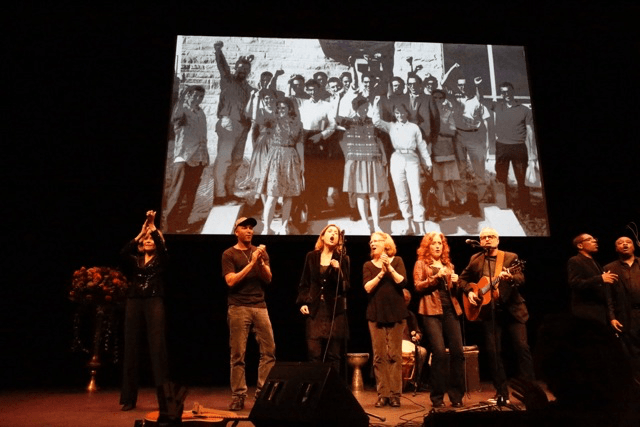February 19, 2017


When Robert Kennedy was assassinated in 1968, the senator’s family picked Tom Hayden to be an honorary pallbearer at the funeral because the young antiwar activist embodied “the great hope that my father had in the future of our country,” Robert Kennedy Jr. recalled Sunday night at a memorial for Hayden.
Hayden, who died in October at the age of 76, had been one of the first white students from northern states to join blacks in Freedom Ride protests against segregation in the South. He’d gotten beat up by police in Mississippi and “gone to jail for his beliefs in Georgia,” Kennedy told the audience at UCLA’s Royce Hall.
Now, he said, Hayden had joined those in heaven “who spent their lifetime fighting for justice, fighting for the poor.”
“He’s there with my father, and with Martin Luther King, and they are right now exhorting that when we leave this hall, we go out into the streets, and onto the barricades, and we fight to reclaim our country from these very, very bad people,” Kennedy said to a round of applause.
Hayden died just over two weeks before Donald Trump was elected president. But none of the roughly 1,000 people who gathered to remember him doubted how vigorously he would have fought Trump’s administration.
The service opened with one civil rights march song, “Keep Your Eyes on the Prize,” and closed with another, “Ain’t Nobody Going to Turn Me Around.” Joining a four-person choir in the final number were singers Bonnie Raitt, Holly Near and Barbara Williams, Hayden’s wife, along with the couple’s son, Liam Hayden, and Hayden’s ex-wife, Jane Fonda.
Hayden was in the vanguard of the 1960s counterculture movement, a radical who led civil rights and antiwar protests and later became a prolific author and member of of the California Legislature.
Hayden was the lead author of the Port Huron Statement, a 1962 student manifesto that served as a foundation for protests against the Vietnam War.
President Nixon’s Justice Department prosecuted Hayden in the raucous “Chicago 7” trial after violent clashes between police and protesters at the 1968 Democratic National Convention. (Two of his codefendants, Rennie Davis and John Froines, attended the service.)
Hayden and Fonda were a major force in California politics in the 1970s and ’80s, and Hayden went on to represent the liberal Westside in the state Assembly and Senate for 18 years.
“Tom was our friend, and boy, could we use his voice right now,” said Father Greg Boyle, the Homeboy Industries founder who worked with Hayden on efforts to rehabilitate gang members.
One former gang member, Alex Sanchez, paid tribute to Hayden for leading him away from a life of crime and violence.
“He believed in me,” Sanchez told the audience as tears rolled down his cheeks. “He believed in change. He didn’t see my tattoos. He didn’t see that I was from the most infamous gang. He saw the real me.”
Hayden’s critics — and there were many — were given voice in a couple of video snippets, including one that focused on his three years of community organizing in poor black sections of Newark in the mid-’60s.
“He was a bum,” Hayden critic Anthony Imperiale of the Newark Citizens Committee was shown saying to a burst of laughter and applause in Royce Hall. “He was a troublemaker, and to this day he’s a troublemaker.”
Troy Garity, the son of Hayden and Fonda, told the crowd it was “slightly difficult being the son of a communist radical and Hanoi Jane, and having our house lit on fire — well, not really, but almost.”
He choked up about video footage showing cops beating up his father and paid tribute to “everybody in the movement who lost somebody.”
“Don’t mourn,” he said. “Organize.”
Fonda recalled meeting Hayden at one of her slide presentations against the Vietnam War. His hair was braided down his back, and he wore a beaded headband and black rubber sandals that the Vietnamese had made out of the tires of a downed U.S. plane.
The next day, he showed her his own slide show, which focused on Vietnamese history. “He talked about how the villagers buried their dead in the rice fields so that generation after generation could be nourished by the bones of their ancestors,” she said. “Bombing those fields took on a new meaning.”
She recalled traveling to college campuses around the country with Hayden in the early 1970s in their campaign to end the war — and the homes of activists who let them spend the night. “God, I remember waterbeds,” she said.
Williams spoke just a few lines about her husband before singing a folk song about pushing a rock uphill. Hayden, she said, had been her teacher for 26 years.
“The most important lesson,” she recalled, “was to never give up.”
Source: © Copyright Los Angeles Times
More Info:
The Rag Blog – Carl Davidson – My Friend and Comrade Tom Hayden
The Rag Blog – Ray Reece – Remembering Tom Hayden and Jane Fonda
Wikipedia
Find A Grave






 Visitors Today : 94
Visitors Today : 94 Now Online : 0
Now Online : 0





















































































































